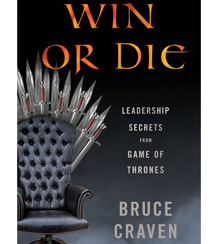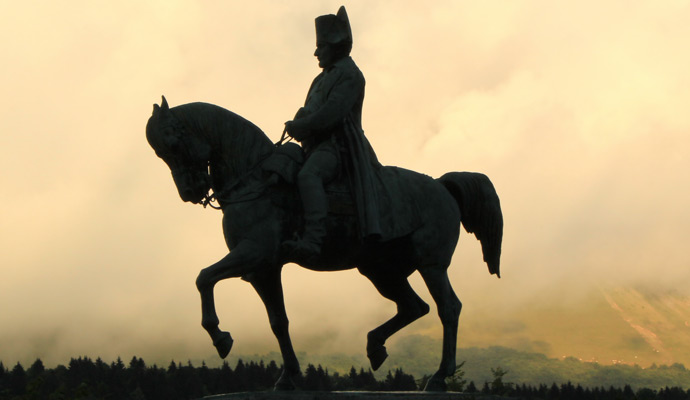Leadership lessons from Game of Thrones
Paying attention to your values and persuasion style can help you avoid getting beheaded or stabbed to death.
A version of this article appeared in the Summer 2019 issue of strategy+business.
Leadership is difficult but necessary. The achievement of good results requires the willingness to confront challenges and guide yourself and your colleagues. In recent years, I have used the fictional stories from George R.R. Martin’s series of novels, A Song of Ice and Fire, and the HBO adaptation Game of Thrones, in my MBA and executive MBA elective course “Leadership Through Fiction” at Columbia Business School. The leadership decisions made by the characters in Game of Thrones sometimes result in devastating consequences, but the characters who survive learn how to improve their decisions and navigate risks more effectively. (For the purposes of this article, we’ll refer to the TV series and the books interchangeably; although they differ in some key ways, they are closely enough aligned to provide the examples used here.)
The narrative in Game of Thrones is derived in part from myth (dragons, sorcery, and the reanimated dead are all elements of the story) and in part from history. It draws on and amplifies many past chronicles of leadership dilemmas and reversals. What looks like a reasonable decision at first can result in trusting the wrong person and being publicly executed. In our own world, we may not face literal execution, but we often must make decisions with similarly wrenching tensions and unpredictable results. We may see our projects falter or our companies founder, and the fortunes of our families, communities, and broader economies may be at stake.
As leaders, we have more capability to manage this tension than we may think — especially if we can keep our perspective. In the first season of the series, Cersei Lannister (queen of the seven kingdoms of Westeros, where most of the story takes place) tells Ned Stark, “When you play the game of thrones, you win or you die. There is no middle ground.” The queen is wrong — both in her fictional world, and in ours. There is a middle ground. It is the realm of thoughtful decision making, with a full appreciation of other people’s values and beliefs. If you decide to play the game of business, learn to understand and leverage your abilities in this middle ground. At least two of the stories from the series can help you play to win.
Ned Stark’s values hierarchy
At the start of the Game of Thrones storyline, Lord Eddard “Ned” Stark, the warden of the North, faces significant leadership challenges. It starts when his old friend King Robert Baratheon (Cersei’s husband) requests his services as the king’s hand — a position equivalent to the royal chief of staff. “I want you down in King’s Landing [the capital city],” says Robert, “not up here at the end of the world where you are no damned use to anybody.” Ned travels with his daughters into a city full of potential allies and enemies. Exhausted and hungry, he arrives just as an urgent meeting of the king’s closest advisors, the Small Council, is beginning. The king has warned Ned that some council members were flatterers and some were fools. As soon as he takes his seat, writes Martin, “He thought he knew [which were which] already.”
Ned thus makes a mistake that many leaders make. He reacts instinctively to his new subordinates, guided by his personal values. The Starks, his aristocratic family, are known throughout Westeros as transparent to others, authentic, and accountable. Their character is exemplified by the wisdom he shares with his son Bran: “[The Starks] hold to the belief that the man who passes the sentence should swing the sword. If you would take a man’s life, you owe it to him to look into his eyes and hear his final words.”
Ned doesn’t realize that others hold different values — or, even if they share his values, present themselves with less transparency. In this context, the term values relates not to corporate or organizational values but to the assumptions and beliefs that drive our behavior. These usually operate at a subconscious level, and are shaped by how we interpret the lessons of our lives. Following our values often brings out the best in us as leaders, driving our motivation and commitment. But values can also drive us to behave counterproductively, without being aware of it. The more clarity we can elicit about how our values affect our leadership, the better.
For example, Ned’s values trigger a disastrous argument with his boss, King Robert. At first, it seems as though there should be no conflict. They were brothers-in-arms during Robert’s Rebellion, the insurrection that overthrew the previous despotic “Mad King,” and they both believe strongly in courage and honor. But as social psychologist Shalom H. Schwartz has documented, people who hold similar values assign different degrees of importance to them. The prioritizing that each person does, usually subconsciously, is called a “values hierarchy.” In his influential work, Schwartz explains that there are six main features to values: (1) We believe in values and have emotional reactions to them; (2) they drive our actions; (3) we believe in them despite what outside norms are encouraged; (4) they are the way we decide what is good or bad, justified or unjustified; (5) they exist in hierarchies; and (6) we base our actions on trade-offs determined by how we evaluate competing values.
While Robert and Ned share two important values, they prioritize them in different ways. Ned’s values hierarchy might be written as duty, then honor, then courage, then family. Robert’s might be courage, then reward, then honor, then camaraderie. Family would probably not appear on Robert’s list of values, as shown by his marginalization of his brother Stannis, his limited regard for the children he believes are his own with Cersei, and his complete disregard for his illegitimate children. Ned’s own values keep him from seeing how important this aspect of Robert’s temperament will be.
Shortly after Ned joins the Small Council, they learn that Daenerys Targaryen, the exiled teenage daughter of the Mad King they deposed, is married to a faraway Dothraki (barbarian) horse lord and pregnant with a potential heir who could challenge Robert’s rule. Robert proposes to send an assassin to kill her and the unborn infant. Lord Stark takes immediate umbrage at the idea; murdering children is, in his view, dishonorable.
The potential exists for the king and his hand to find common ground and work out an agreement, but as their values are called into question, both men become angry. King Robert is particularly offended because he thinks Ned is challenging his courage. The two allies fall into a public, destabilizing argument that leaves them both vulnerable to their more immediate enemy, Queen Cersei.
Could the drama play out any other way? One of the compelling aspects of Game of Thrones is that a different outcome always seems possible if only the main characters were a bit more self-aware. For example, Ned doesn’t realize how his own biases make him vulnerable. In one memorable scene, Lord Varys, the “master of whisperers,” approaches Ned in disguise and shares confidential information with him, alluding to plots against the king and against Ned’s predecessor, Jon Arryn. From Varys’s perspective, this warning is an act of courage, duty, and honor. But Ned Stark doesn’t see it that way; he understands those values only if they are presented in a way similar to his own behavior. If Varys were acting with courage and honor, Ned believes, he wouldn’t sneak into Ned’s room in disguise.
Meanwhile, Ned misreads Cersei’s reactions to him, assuming that her values hierarchy holds family as primary. He fails to understand the way her values contribute to her leadership choices. She assigns superiority, power, and courage even more importance than family. Moreover, Cersei doesn’t consider her husband, the king, to be part of her family. This is an important distinction that Ned doesn’t see until it is too late. Finally, Cersei doesn’t give a damn about Ned’s priority of honor. If she cared, then she would retreat: take her children “as far as the wind blows,” to save them from Robert’s wrath when Ned exposes their illegitimacy. Instead, Cersei replies: “And what of my wrath, Lord Stark?” Ned’s error in misperceiving Cersei — especially her belief in her own power and superiority — sets in motion the tragedy that follows, including his own beheading.
This story provides a powerful reminder that the pressures of day-to-day leadership can trigger conflict between colleagues, even if they have been through strong mutual experiences, feel extensive mutual goodwill, trust one another, and have common goals. If we make assumptions about personal values, we can make devastating mistakes. For example, if we assume other people need to prioritize their values in the order we prefer, we can deceive ourselves about other people’s true motivations, blind ourselves to risk, and damage the partnerships we need.
It is thus important that we, as leaders, search for clarity about the values of our allies and competitors. What more might Ned have learned from Lord Varys if he had taken the time to ask and listen? What if he had tried to understand Queen Cersei’s motivations before assuming she would shiver in fear at his threat, weep thankfully at his offer to save her children, and flee the capital? Use your values as a map of what is internally important to you, and don’t fall into the trap of assuming that the same values motivate your colleagues and competitors. Keep your head where it can be a resource, not tarred on a stake above the Red Keep.
Jon Snow’s persuasion challenge
In season five of the TV series, Lord Commander Jon Snow — the leader of the Night’s Watch fraternal order, which guards the 700-foot-high ice wall that spans the northern end of Westeros — must make a decision that has no easy solution. After many long years of dormancy, a group of supernatural “others” have reappeared beyond the wall, with the ability to reanimate the dead and turn them into zombie-like wights. Their first victims are the self-professed free folk (or “wildlings”) who live on the other side of the wall, and who have been fierce enemies of the Night’s Watch for more than 1,000 years.
Should Jon strike a mutual protection deal with free folk, letting them move behind the wall and joining forces with them? This will be extremely difficult for many members of the Night’s Watch; only recently, the wildlings fought bitterly with them, killed their friends, and massacred nearby communities — including some Night’s Watch members’ families. But the alternative would be worse. If the wildlings fall to the others, they will become part of the opposing army, and eventually the Night’s Watch — and the kingdoms it protects — will fall. Further, the dead men of the Night’s Watch could rise themselves as wight soldiers.
This type of challenge calls for strategy and persuasion: skills that can’t be taken for granted, no matter what rank a leader may hold. “Leadership does not depend on position,” write scholars Robert E. Quinn and Ryan W. Quinn in their book Lift: The Fundamental State of Leadership. They describe leadership as a social process, often triggered “when people choose to follow someone who deviates from at least one accepted cultural norm or social convention.”
In Game of Thrones, when Jon Snow makes his decision, he must persuade his colleagues of the Night’s Watch to join him. His persuasion skills reflect his values: truth, then community, then empathy, then courage. Taken in reverse order: He exemplifies courage every day, both as a warrior and in confronting his Night’s Watch brothers’ attitudes about the wildlings. His commitment to empathy is noticeable in his insistence on recognizing the basic humanity among people who have been ridiculed or feared, including his friend Samwell Tarly and the wildlings in general. Jon’s commitment to his community is the result of always being cast as a bastard son, and thus an outsider in House Stark. He understands the importance of being inclusive.
But most of all, he is driven by truth. He has grown up without knowing who his true parents were, and he has repeatedly made sacrifices on behalf of a deeper understanding of the realities around him. As an outsider since childhood, thrust into the role of leader, he understands that truth isn’t just a talking point. The reality of the Night’s Watch — in this case, the existential threat they face and the humanity they share with the wildlings — can’t be spun or adjusted to suit a particular leadership agenda.
Jon thus uses his authority as the new lord commander to invite all the free folk to cross into Westeros and find new safe homes in the seven kingdoms. In exchange, the wildlings will promise to abandon their nomadic warrior practices of rape, reave, and murder. They will give up any items they own that can be sold for food. They will also allow their children to be placed into Westerosi homes as wards. This is a sort of hostage situation to ensure the wildlings won’t go rogue and start slaughtering their new allies. Some of the wildlings will even join the Night’s Watch and take the oath to protect civilization from the emerging threat to humanity. Jon’s free-folk counterpart, Tormund Giantsbane, agrees to all these harsh demands; he too is a realist.
But getting the support of the Night’s Watch members is more difficult. Jon doesn’t believe he has much time to do this. He expects the truth of the situation to be sufficient persuasion in itself. This is where his leadership skills fail him.
Bob Bontempo, who leads a session on persuasion in the executive education department of the Columbia Business School, says that persuasion is a discipline that takes time. He uses the analogy of planting a grain of sand in an oyster to create a pearl. The grain of sand is an invitation to consider the possibility of an idea. Intelligent adults aren’t convinced by argument. They are convinced by themselves, when they take time to reflect on a question and make an eventual, considered decision.
Bontempo points out that we often approach a persuasion challenge as if it were a truth wins situation: where we have a demonstrably correct answer based on facts. If the facts are completely on our side, then persuasion isn’t necessary. Instead, the listener has a eureka moment, in which the validity of the new insight is suddenly apparent.
But we don’t always have eureka moments at our disposal. We rely upon persuasion when an objective, inarguable truth isn’t available, when the facts can be interpreted in different ways and judgment is required. Then the persuader, instead of arguing to prove a truth, must enable the listener to accept a mere possibility – to accept the idea that another explanation might be viable and begin to consider it.
For the wildlings who live on the other side of the wall, Jon Snow’s argument produces that eureka moment. That’s why Tormund Giantsbane is ready to negotiate: He has seen the horror of the White Walkers himself. It is a truth wins situation for the wildlings because they have no wall to protect them.
In confronting his brothers on the Night’s Watch, Jon Snow similarly believes that the truth will win. He is wrong. He faces a communication situation in which the answer depends on the judgment of his subordinates. To be sure, many of them agree with him, but a sizable minority, including some of the senior leaders — Jon’s direct reports — are not convinced. They understand the White Walkers are real, but they don’t believe the wildlings can be trusted, and they think the wall, which has held for thousands of years, will withstand any threat. Let the wildlings and White Walkers wipe each other out on the other side. Why should the Night’s Watch care?
Jon stumbles in this critical leadership moment because he underestimates the potential backlash of resistance on his team. His truth is not their truth. They are stuck in what Bontempo calls the “latitude of rejection.” They have fought themselves in bloody battles against the wildlings, and have seen their friends killed. One boy, Olly, saw his parents murdered by marauding wildlings.
“The lord commander must pardon my bluntness,” says Night’s Watch steward Bowen Marsh, “but I have no softer way to say this. What you propose is nothing less than treason.”
Jon responds that their mutual purpose should be the defense of humanity. “I am the shield that guards the realms of men. Those are the words [of our oath]. So tell me, my lord — what are the wildlings, if not men?” When Bowen Marsh remains unconvinced, Jon stops trying and wheels his horse away; he allows Marsh to stay locked in his bias. He then issues the command to execute his strategy and let the wildlings enter, assuming that his angry team members will resign themselves to following his orders.
Instead, a few days later, they lure him into a trap and surround him. He believes they are his sworn allies, but they pull out their knives and unexpectedly stab him. Olly knifes him in the heart.
Had Jon Snow engaged in more deliberate conversation, he could have talked openly about the level of anger and rebellion triggered by his leadership decision. He could have chosen to imprison or constrain his potential assassins. Or he might have persuaded them by explaining his judgment more fully, supported by a real discussion of the risks. He could have reminded them of the terrors they had seen from the wights, including two who had come to life inside the castle. “Would an army of wight wildlings be an issue?” This question would have acted as a useful grain of sand and could have supported his effort to defend humanity against a terrible threat.
Later in the series, Jon Snow is brought back to life through sorcery — a painful process. He reflects on his failure: “I did what I thought was right. And I got murdered for it.” We all need to remember that when we move into new territory as leaders, even after we achieve success, we may still stumble. If our followers are anchored in the latitude of rejection, we have to find time to communicate — to place the grain of sand into the oyster. Jon Snow could have taken the time to let his more experienced members of the Night’s Watch, such as Bowen Marsh, think through the options and join him in evaluating them. Jon fell into the trap of believing he was limited by time. He did face time constraints, but what limited Jon even more, and seemingly cost him his life, was his inability, as a leader, to practice the art of persuasion under pressure.
Leaders in fiction and reality
Ned Stark and Jon Snow, as any reader or viewer of the series knows, are just two of many Game of Thrones characters who wrestle with the demands of leadership. The list includes quite a few largely unsympathetic characters, focused on accumulating power and its rewards, such as Petyr Baelish, Joffrey Baratheon, Ramsey Bolton, Theon Greyjoy, and Tywin Lannister. But there are a number of ultimately heroic leaders in Westeros: people like Daenerys Targaryen, Samwell Tarly, Davos Seaworth, Lord Varys, Tyrion Lannister, Jaime Lannister, Brienne of Tarth, Jorah Mormont, and the surviving Stark siblings: Sansa, Bran, and Arya. The leaders in Game of Thrones are compelling examples because they are imperfect, under enormous stress, and dedicated to delivering results beyond their own individual betterment. Each, in his or her own way, is driven to improve the world.
Leadership — for them, and for true leaders in our world — isn’t about winning, about having followers, or about fulfilling our wants and desires. It is about service. It involves the ability to dance in different roles, delivering what is needed. It also involves the ability to live out a story that others will tell, and to inspire transformation in people’s lives.
The leaders in Game of Thrones are compelling examples because they are imperfect, under enormous stress, and dedicated to delivering results beyond their own individual betterment.
Daenerys Targaryen is perhaps the most compelling example of such a leader. She is the exiled daughter of royalty. Her life since childhood has been a path of tragic episodes and constant threat. She has confronted these challenges by leading herself to discover and pursue her purpose and develop her leadership skills accordingly. These skills include managing a large and contentious group of advisors and soldiers, and (as the “mother of dragons”) learning to tame and ride the once-mythical creatures that she has raised from their eggs. She must also continuously learn to tame her own impulses. Her values hierarchy, from strongest to weakest, includes freedom, power, courage, responsibility, and equality. These values compel her not just to assemble and lead a conquering army, but to change the world for the better: to bring improvement to the lives of the poor, the vulnerable, and the disenfranchised. She famously says that her goal is to “break the wheel”: to stop the cycle of wealthy families that fight their way to the top and crush those beneath them in the process.
Toward the end of the series, as Daenerys gets closer to attaining the iron throne (on which the royal leader of Westeros sits), she learns about a greater challenge to the vulnerable: the “Night King” in the North and his army of wights. How will the mother of dragons lead as winter arrives in Westeros? She and her allies — a team that has slowly and painfully come together — do not face an easy path or simple decisions. Yet this team seems to offer the only chance for humanity to survive. In other words, everything depends on their ability to muster effective, courageous leadership — and Daenerys’s ability to lead the leaders. What can we learn from their challenges and opportunities?
The Song of Ice and Fire narrative isn’t quite over, so we can’t say for sure. But there is one lesson to take to heart. If you must face a difficult challenge — your own equivalent to White Walkers and wights — then accept that challenge and face it. You will make mistakes. You will stumble. Fear will overwhelm you. But this is your chance to commit to what is important and pursue what matters. Dedicate yourself to seeking what you can bring back to your community.
Those of us who aspire to be better leaders tend to reach a moment when we understand our presence more completely. There is no time that is better or more pure. We are free. We have made mistakes and bad decisions. We have felt regret and remorse. But we can remember the moment when Tyrion Lannister protests that the murders he has committed — of his lover and his father — should disqualify him as a compassionate leader. Replies Lord Varys: “I never said you were perfect.” We can’t expect perfection, but we can expect adventure…in a form that meets and matches our commitment.
Author profile:
- Bruce Craven is the director of Columbia Business School’s Advanced Management Program, where he also teaches the popular elective Leadership Through Fiction. He has taught workshops on resilience and flexible thinking for organizations in the United States and Europe.
- Also contributing to this article was strategy+business contributing editor Juliette Powell.
- Adapted from Win or Die: Leadership Secrets from Game of Thrones, by Bruce Craven. Copyright © 2019 by the author and reprinted by permission of St. Martin’s Press.






